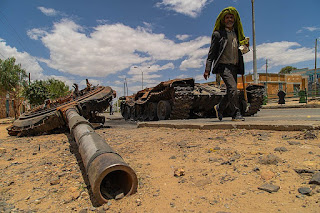Globally - some 24 million people were displaced by extreme weather in 2021, and the U.N. expects that figure to soar. In Sudan, some 3 million people were displaced by conflict and natural disasters even before the current fighting.
FIGHTING makes poor places rapidly poorer. A typical five-year civil war reduces income per head by a fifth, estimates Christopher Blattman of the University of Chicago in his book ''Why We Fight''.
So it is alarming that wars are lasting longer. The average ongoing conflict in the mid-1980s had been happening for about 13 years, by 2021 it was nearly 20 years.
Climate change is aggravating the mayhem. It does not directly cause conflict, but when pastures dry up, herders drive their hungry cattle farther afield, often encroaching on land claimed by the rival ethnic groups.
A review of 55 studies by Marshall Burke of Stanford University and others found that a one-standard-deviation increase in local temperature raises the chance of intergroup conflict by 11% compared with what it would have been at a more normal temperature.
Since 1945, conflicts have come in three overlapping waves. First, people in European colonies struggled for independence. Then, rival groups fought for control of these newly independent states.
The cold war raised the stakes : the West backed insurgencies against the governments that professed to be Marxist, from Angola to Nicaragua. The Soviet Union supported anti-capitalist guerrillas and revolutionary regimes on every continent.
After the collapse of the Soviet Union in 1991, the number of wars fell sharply. So, too, did the estimated number of deaths in battle.
Most modern conflicts are harder to understand. They are usually civil wars, though many involve foreign meddling. They are largely in poor countries, especially hot ones like Sudan.Indeed, they form a belt of pain around the equator.
They cause millions of deaths, but exactly how many is hard to estimate.Far more perish from war-induced hunger or disease than from bullets and shrapnel.
Between 2001 and 2010 around five countries each year suffered more than one simultaneous war or insurgency. Now 15 do. Sudan has conflicts in the east, west and south. Complex wars are in general harder to end.
It is not enough to find a compromise that satisfies two parties; a deal may need to please dozens of groups, any one of which may cock its kalashnikov again if unsatisfied.
CIVIL WARS are also becoming more international. In 1991 only 4% of them involved significant foreign forces. By 2021 that had risen 12-fold to 48%, reckons the Uppsala Conflict Data Programme, a research project.
In the past decade this process has been driven partly by America's retreat from its role as global policeman, and mid-sized powers filling the vacuum.
Russia and Turkey spar over Libya and Syria; Saudi Arabia and Iran have fought a proxy war over Yemen. In Sudan, Egypt supports General Burhan while Hemedti is pals with Russia.
Foreign meddling can be benign, as UN peacekeeping operations generally are, even if they often blunder. But interventions by external powers with selfish agendas tend to make civil wars last longer and cost more lives, finds David Cunningham of the University of Maryland.
The costs for external actors are lower - their own cities are not being destroyed - so they have less incentive to make peace.
Globally, some 24 million people were displaced by the extreme weather in 2021, and the UN expects that figure to soar. In Sudan, some 3 million people were displaced by conflict and natural disasters even before the current round of fighting began.
The bloodiest war in the world last year was not in Ukraine but in Ethiopia, notes Comfort Ero, the head of Crisis Group, a think-tank.
Olusegun Obasanjo, a former president of Nigeria who helped broker a peace deal in November between the government and the Tigray region, has put deaths at 600,000 between 2020 and 2022. No estimate for Ukraine is as high.
Mohammed Kamal, an Ethiopian farmer, was ploughing his fields when he heard shooting. Returning to his village, he found that gummen had murdered 400 people, mostly women and children. '' Only a small number survived,'' he says.
Even if the peace deal holds, which is uncertain, it will not help Mohammed. For the massacre he witnessed was part of an entirely separate conflict, which is still blazing.
While government troops were distracted by the war in Tigray, members of Ethiopia's largest ethnic group, the Oromo, revived an old insurgency, and are trying to drive other ethnic groups out of their home region.
If that sounds complicated , it is actually more so. Ethiopia has more than 90 ethnic groups, many of whose leaders are tempted to stir up hatred to win control of one of the country's 11 ethnically based regions. It hosts hundreds of thousands of refugees from four turbulent neighbours [ Eritrea, Somalia, South Sudan and Sudan ].
The dictatorship next door [ Eritrea ] has sent armies to fight against a previous Ethiopian government, and arm-in-arm against the current one.
WAR creates a vicious circle. As droughts and floods have devastated rural areas, young men, young students with no prospects feel more tempted to pick up a gun and grab land or loot. Rebel recruiters understand this only too well.
Facebook accounts linked to OLA show videos of young fighters celebrating with stacks of cash they have liberated from banks. With so many fighters lurking in the bush, kidnapping shopkeepers and murdering officials, businesses flee the area and public services get even worse.
Locals then grow even more frustrated and angry, especially when the state responds with repression, which it often does.
The Master Essay continues. The World Students Society thanks, The Economist.

.png)




